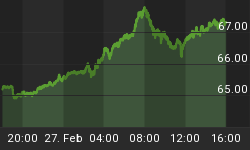Paul Tudor Jones, once fittingly observed, "Fundamentals might be good for the first third or first 50 or 60 percent of a move, but the last third of a great bull market is typically a blow-off, whereas the mania runs wild and prices go parabolic... There is no training, classroom or otherwise, that can prepare for trading the last third of a move, whether it's the end of a bull market or the end of a bear market."
In today's policy driven system, where fundamentals have been melded and supplanted by the hand of the Fed, the relative outperformance by our own monetary authorities has not only buttressed US equity markets relative to the world, but also the dollar. This dynamic has been in place since the embers of the US financial crisis, blew across the pond in the summer of 2008 and ignited a firestorm around the world that fall. Despite our clear culpability in setting the world ablaze, in another counterintuitive twist of fate, we had a head start of working and digging the fire lines, that eventually brought the economic disaster under control - first. The "new normal", posited directly following the financial crisis, looked a whole lot like the old normal from the late 1990's.
*Charts updated through Friday's close
With the US dollar index now flirting with the topside of its long-term range, a break above might imply that the move was not the last third - but a new game altogether. Considering the juxtaposition of the Fed withdrawing its fire brigade as the rest of the world turns up their hoses - how likely does that seem?
At face value - and from an "old school' fundamental perspective, quite likely. However, as we alluded to before, since the financial crisis, the doctrines that have instigated the reach for yield and differential of capital flows towards the US, have been framed relative to what the balance of the worlds major central banks were doing to support their own economies. With the ECB now finding religion and the Chinese seemingly not far behind, the shear stresses that have engendered a positive skew in the US equity markets and dollar, should diminish as the Fed walks away. Moreover, we find it noteworthy that the conventional wisdom in the euro today now echoes the expectations from earlier in the cycle for the dollar: that the currency would be pressured lower by Fed policy.
From a broader macro point of view, it appears more likely that the dollar is completing "the last third of the move", rather than a return to conditions of the late 1990's that an upside range break would imply.


















